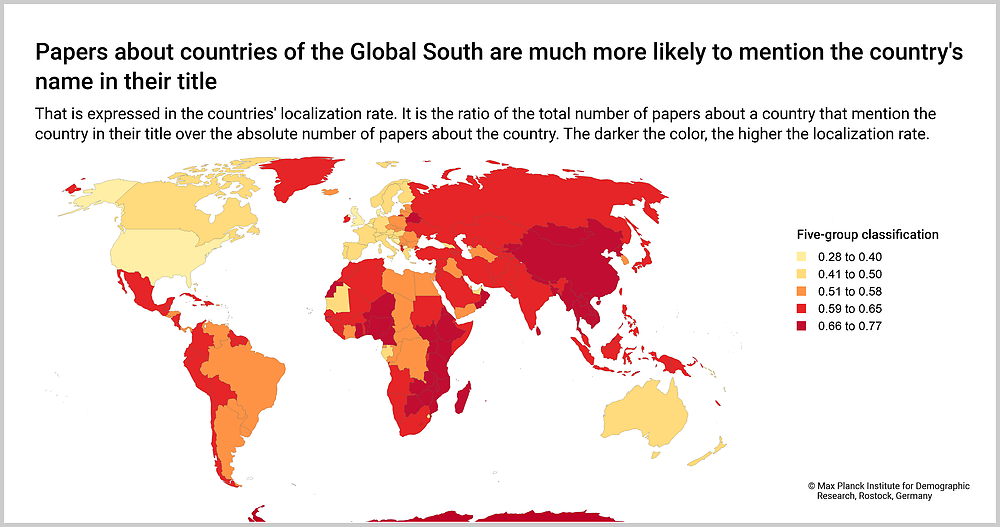March 02, 2022 | Press Release
Science of Science: Is Knowledge Produced in the Global North Perceived as More Generalizable?

© iStockphoto.com/Zephyr18
In their recently published paper in PNAS, MPIDR Researchers Andrés Castro and Diego Alburez-Gutierrez analyze over 560,000 records of English publications drawn from the bibliometric database Scopus. They find that social science papers on countries in the Global North are much less likely to state their geographic focus in the article titles than studies focused on the Global South.
“We interpret this finding in the context of existing inequalities in the production of science,” says Andrés Castro, until recently Researcher at the Max Planck Institute for Demographic Research (MPIDR). His MPIDR colleague Diego Alburez-Gutierrez adds: “We argue that this reflects a form of Eurocentrism, i.e., a view that considers knowledge produced in or about the Global North as more ‘universal’ or ‘generalizable,’ whereas knowledge about the South is considered ‘specific’ and ‘localized.’”
The two researchers find that social science papers on countries in the Global North are much less likely to state their geographic focus in their titles or abstracts than studies focused on the Global South. This is true for all social science disciplines. However, disciplines like demography are considerably more likely to specify the geographic focus of their study compared to disciplines like psychology.
For their analysis the researchers used bibliometric data from the online publication database Scopus. They excluded articles like editorials or book reviews that have no empirical component and focused on articles with an abstract and classified to one of 27 social science categories. This resulted in a sample of over 560,000 records of English publications. To extract references of country names from these records, the researchers used regular expression matching algorithms. They identified whether a title or abstract contains one or more English country names, including abbreviations, alternative spellings like “U.S.A,” and demonyms like “Colombian.” Their paper was recently published in the high impact journal PNAS.

© MPIDR
Download Figure (PNG File, 718 kB)
“Inequalities in the production of scientific knowledge are largely unrecognized,” says Diego Alburez-Gutierrez. This was the reason that led the researchers to explore the scope of this issue on a global scale.
“We encourage authors, journal editors, and mentors in the social sciences to take our findings into account. The perpetuation of the ongoing trends is a threat to the inclusivity that has become a pillar of science,” says Andrés Castro.
Original Publication
Castro Torres, A.F., Alburez-Gutierrez, D.: North and South: Naming practices and the hidden dimension of global disparities in knowledge production. PNAS (2022). DOI: 10.1073/pnas.2119373119
Authors and Affiliations
Andrés F. Castro Torres, Max Planck Institute for Demographic Research, Rostock
Diego Alburez-Gutierrez, Max Planck Institute for Demographic Research, Rostock